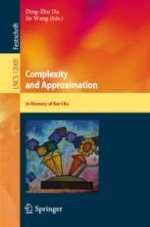2020 | OriginalPaper | Chapter
On Nonadaptive Reductions to the Set of Random Strings and Its Dense Subsets
Authors : Shuichi Hirahara, Osamu Watanabe
Published in: Complexity and Approximation
Publisher: Springer International Publishing
Activate our intelligent search to find suitable subject content or patents.
Select sections of text to find matching patents with Artificial Intelligence. powered by
Select sections of text to find additional relevant content using AI-assisted search. powered by
